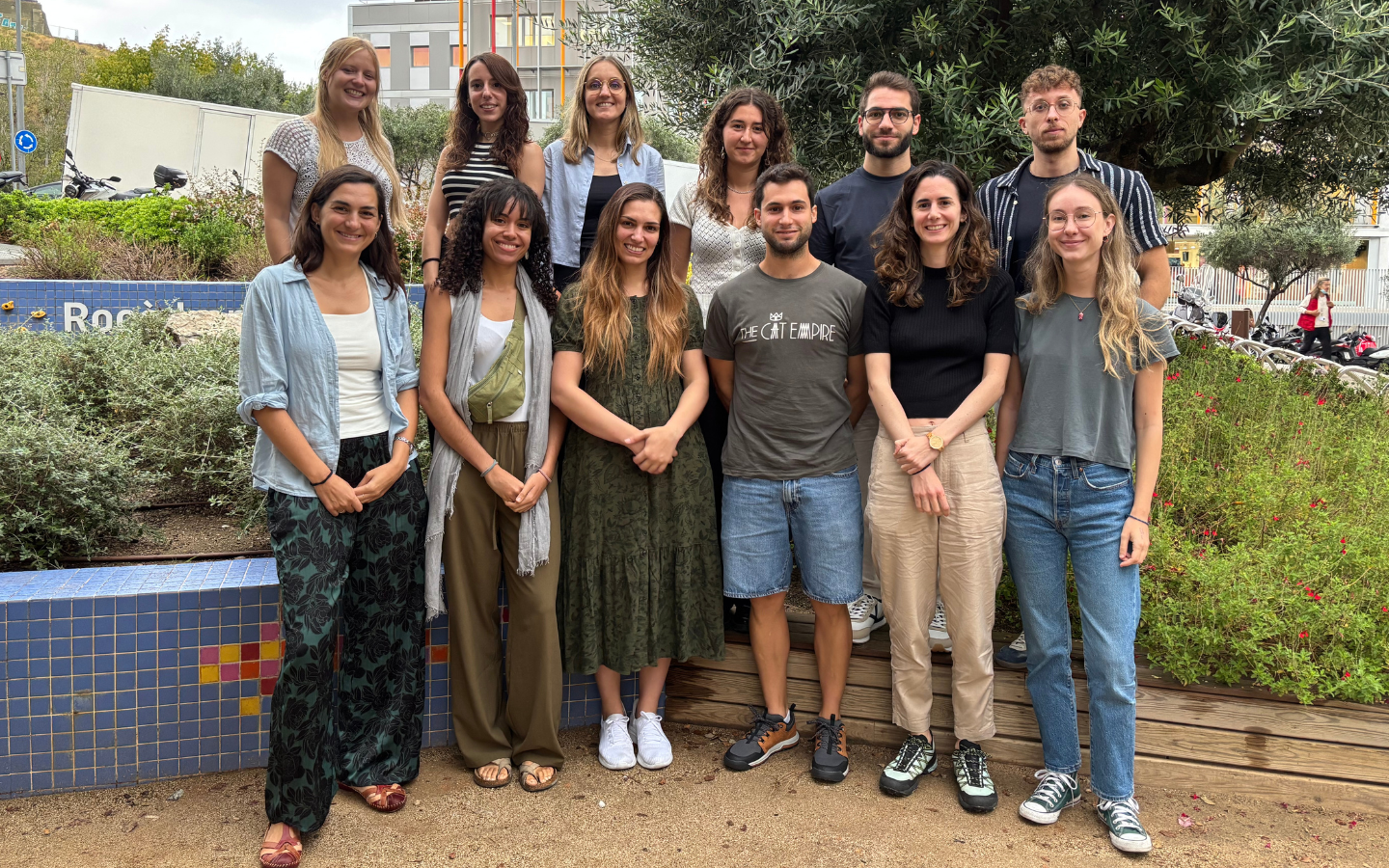Paediatric Cancer Epigenetics
Research Program
Leaders
Where we are
 SJD Barcelona Children's Hospital
SJD Barcelona Children's Hospital
Related websites
Developmental tumours are biologically distinct from adult cancers: They do not display high levels of mutational accumulation, but instead are characterized by epigenetic deregulation. In the Paediatric Cancer Epigenetics Lab we ask fundamental questions about the biology of developmental tumours: How does epigenetic dysregulation lead to cancerogenesis? Which progenitor cells are amenable to epigenetically-driven maligant transformation? What makes these progenitors especially susceptible, and can their transformation be reversed?
Our overall goal is to identify the specific epigenomic vulnerabilities of developmental tumours, and to exploit them in the pursuit of personalized therapiesto improve patient welfare and prognosis. We belive that one size does not fit all, and we need to treat the individual, not the disease.
The group's main focus is on malignant rhabdoid tumours (MRTs): highly malignant and heterogeneous paediatric cancers, characterized by biallelic inctivation of the SWI/SNF chromatin remodelling complex subunit SMARCB1. Functional loss of SMARCB1 is the only recurrent alteration in MRTs, making them the purest example of epigenetically driven tumourigenesis to date
Research lines
- The epigenome of MRTs is altered as a result of functional SMARCB1 loss. However, which of the numerous changes are responsible for malignant transformation is unknown. Using (epi)genomic approaches and gene editing, we are teasing apart the epigenomic changes that drive malignant transformation from those that are mere bystanders. With this knowledge we will focus therapeutic development to target the drivers of this disease.
- MRTs are a highly heterogeneous disease that can arise in multiple organs. However, the cell(s)-of-origin of the disease remain enigmatic. Using lineage tracing and computational biology methods, we are investigating the origins of different subtypes of MRTs.
- Some MRTs have an abundant immune cell infiltrate, while others are completely immune cold. We are investigating the source of immunogenicity in MRT tumours, and assessing how it could be exploited for treatment (e.g. using immunotherapy).
Scientific objectives
- Characterise MRT disease heterogeneity on cellular, transriptomic and epigenetic levels to aid disease sublassification and patient stratification.
- Identify the epigenomic aberrations of MRTs that are causal for malignant transformation.
- Evaluate if "bystander" epigenomic alterations could be therapeutically exploited.
- Identify the cell-of-origin of different MRT subtypes.
- Pinpoint the source of immunogenicity in MRT subsets, and assess whether it can be exploited therapeutically.
- Assess how epigenetic targeting can synergise with standard-of-care treatment to improve patient prognosis.
Area/Field of expertise
-
Our work relies on multi-disciplinarity, promoting the integration of cell and molecular biology techniques, lineage tracing, CRISPR/Cas9 genome editing, cytometry, microscopy, cancer (epi)genomics and computational biology. Our team has ample expertise in experimental and computational biology approaches.
The close association between the IRSJD and SJD Barcelona Children's Hospital aims to bridge the gap between bench and bedside, ultimately aiming to identify novel therapeutic intevention points to improve patient prognosis and welfare.

Group members
-

Jefe de Grupo
-

Carlos Javier Rodriguez Hernandez
Investigador post-doc
-

Paula Bujosa Rodríguez
Investigador post-doc
Last Publications
- Lorito N, Subbiani A, Smiriglia A, Bacci M, Bonechi F, Tronci L, Romano E, Corrado A, Longo DL, Iozzo M, Ippolito L, Comito G, Giannoni E, Meattini I, Avgustinova A, Chiarugi P, Bachi A and Morandi A FADS1/2 control lipid metabolism and ferroptosis susceptibility in triple-negative breast cancer EMBO Molecular Medicine . 16(7): 1533-1559.
- Sanchez-Guixe E, Muiños F, Pinheiro-Santin M, González-Huici V, Rodriguez-Hernandez CJ, Avgustinova A, Lavarino C, González- Pérez A, Mora J and López-Bigas N Origins of Second Malignancies in Children and Mutational Footprint of Chemotherapy in Normal Tissues CANCER DISCOVERY . 14(6): 953-964.
- Llorente A, Blasco MT, Espuny I, Guiu M, Ballaré C, Blanco E, Caballé A, Bellmunt A, Salvador F, Morales A, Nuñez M, Loren G, Imbastari F, Fidalgo M, Figueras-Puig C, Gibler P, Graupera M, Monteiro F, Riera A, Holen I, Avgustinova A, Di Croce L and Gomis RR MAF amplification licenses ERa through epigenetic remodelling to drive breast cancer metastasis NATURE CELL BIOLOGY . 25(12): 1833-1847.
Projects
- Project name:
- ONCO-COMP_Oncogenic competence during development – When, Where and Why?
- Leader
- Alexandra Avgustinova
- Funding entities:
- European Commission, Fundació Privada per a la Recerca i la Docència Sant Joan de Déu - FSJD, Rodriguez Hernandez, Carlos Javier
- Code
- 101076506
- Starting - finishing date:
- 2023 - 2028
- Project name:
- PFEC0013 - Coordinación PFE00104_ONCO-COMP_Alexandra Avgusti
- Leader
- Alexandra Avgustinova
- Code
- PFEC0013
- Starting - finishing date:
- 2023 - 2028
- Project name:
- GLEBioassay_Nano-Monitoring of Cancer Immunotherapy Efficiency: The Lateral Electrophoretic Bioassay platform.
- Leader
- Carlos Javier Rodriguez Hernandez
- Funding entities:
- Instituto de Salud Carlos III (ISCIII)
- Code
- AC21_2/00045
- Starting - finishing date:
- 2022 - 2025
News
-
An aggressive childhood cancer case opens new avenues for advanced cell therapies
A positive response to therapy in a paediatric patient with a renal rhabdoid tumour has enabled researchers to identify immune cells with anti-tumour activity in this rare cancer.
-
IRSJD and IRB Barcelona strengthen their research collaboration in pediatric cancer
The agreement includes the opening of a laboratory, led by Dr. Alexandra Avgustinova, which will address the specific vulnerabilities of developmental tumours to discover new therapeutic approaches. The shared Pediatric Cancer Epigenetics laboratory will be located on IRB Barcelona premises.
-
The Catalan Tumour Bank Network launches a new corporate identity and website
The Xarxa de Bancs de Tumor de Catalunya (XBTC) has renewed its corporate identity and website to project a more dynamic and local network in the biomedicine and health ecosystem.

 SJD Barcelona Children's Hospital
SJD Barcelona Children's Hospital